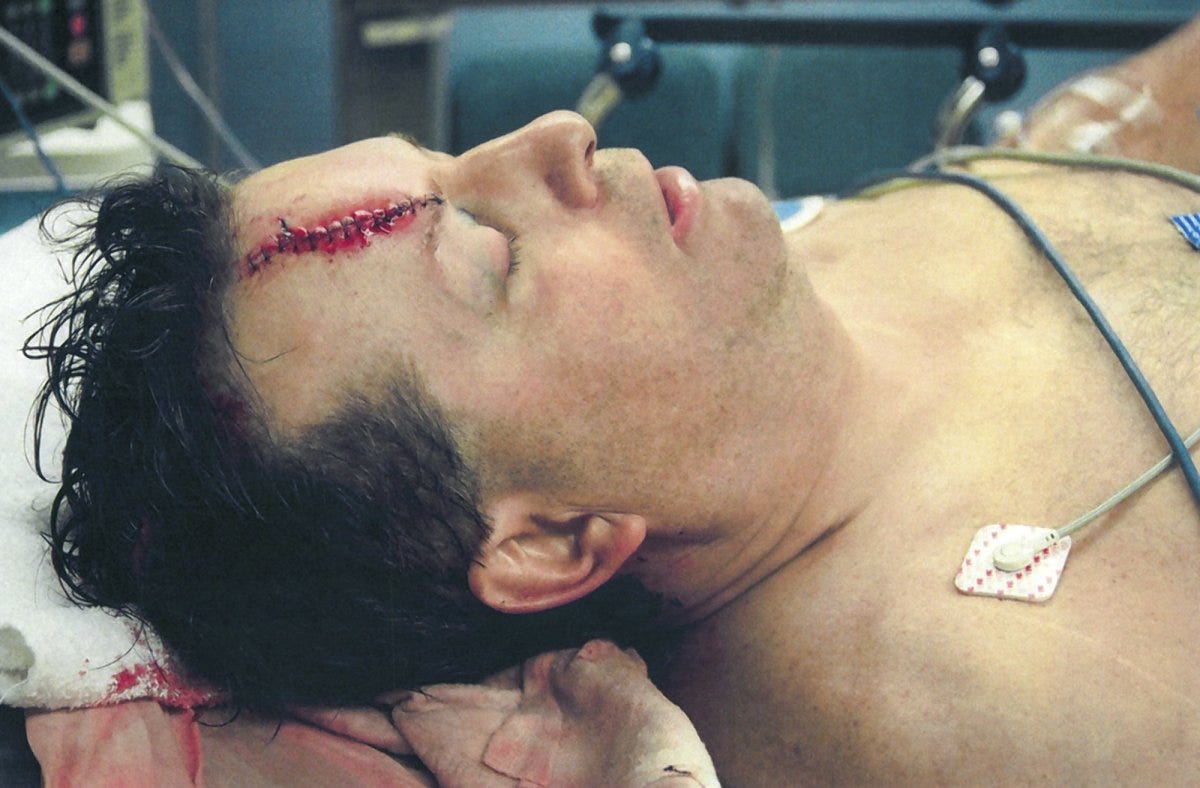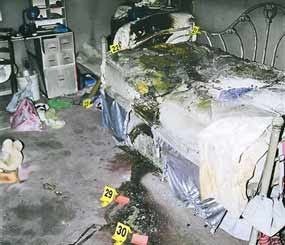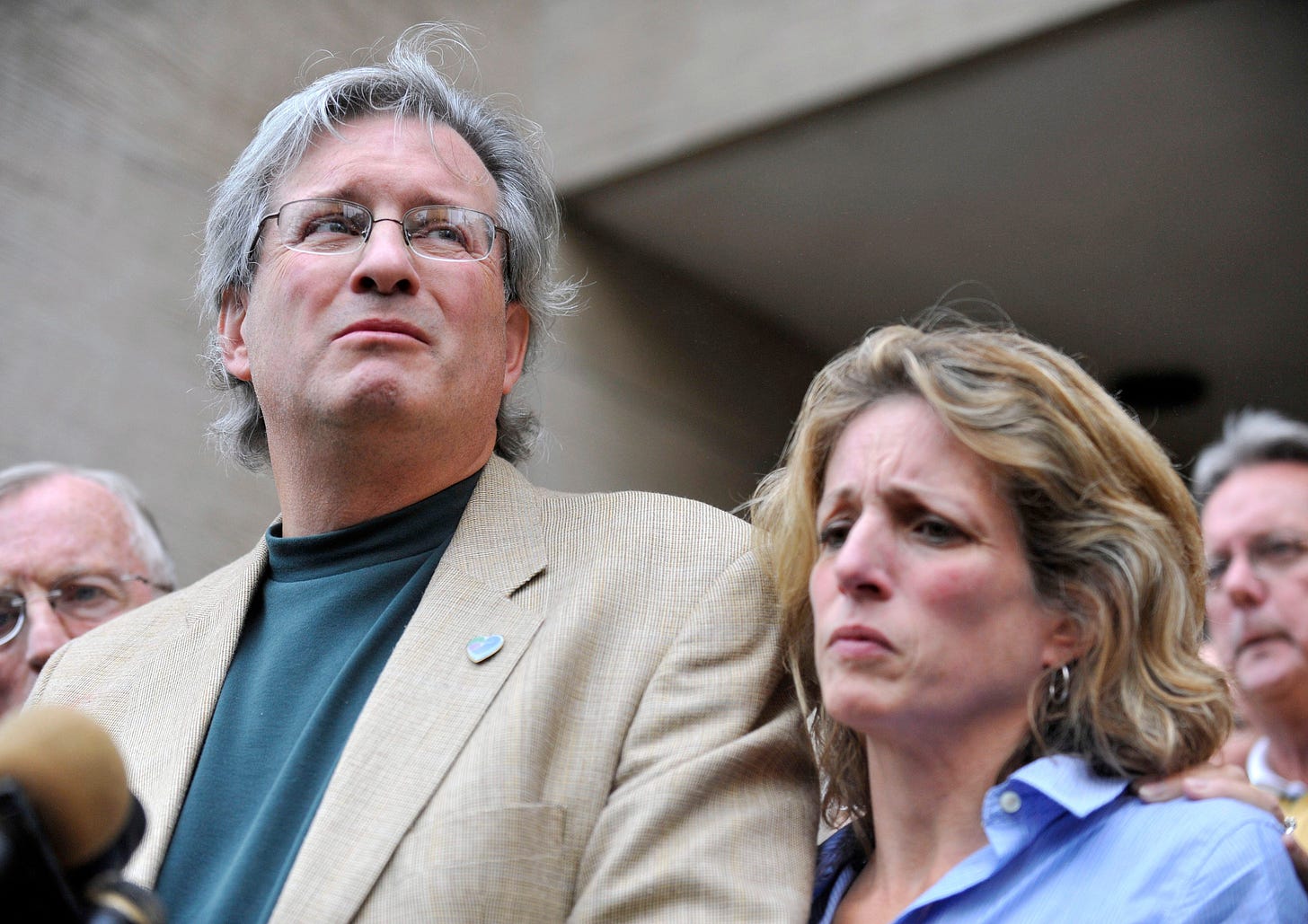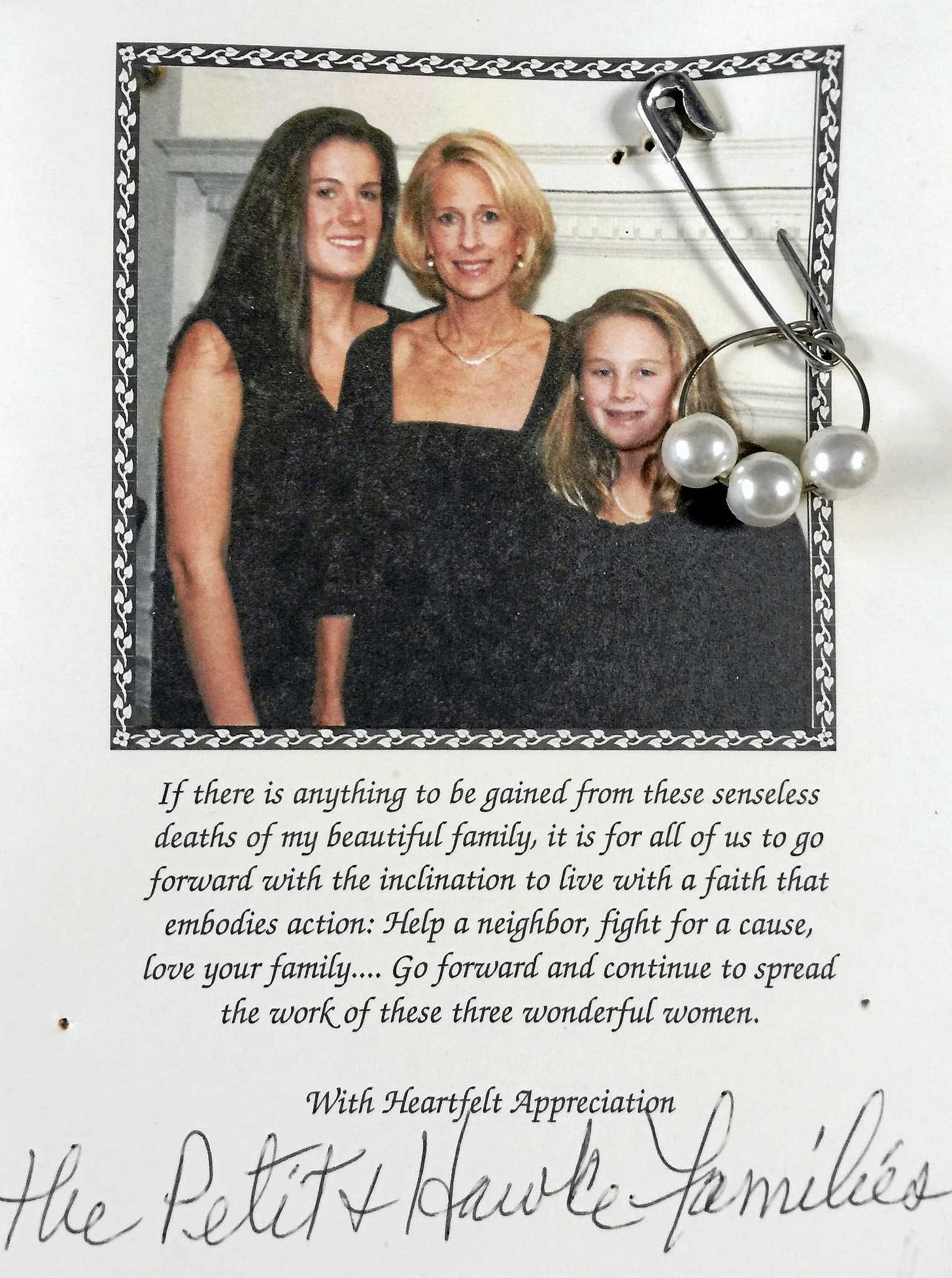Cheshire Home Invasion Murders
On the evening of Sunday, July 22, 2007, 48-year-old Jennifer Hawke-Petit and her youngest daughter, 11-year-old Michaela, went to a local Stop & Shop grocery store in Cheshire, Connecticut to pick up ingredients for the dinner Michaela planned to cook that night.
At the store, Komisarjevsky noticed them, and followed them home. Afterwards, Hayes sent a text message to Komisarjevsky that read, "I'm chomping at the bit to get started. Need a margarita soon." Hayes then said, "We still on?" and Komisarjevsky replied, "Yes."
Hayes's next text asked, "Soon?", to which Komisarjevsky replied, "I'm putting the kid to bed hold your horses". Hayes replied, "Dude, the horses want to get loose. LOL."
Dr William Petit passed out on the couch with a newspaper on his chest. He had just eaten a big plate of pasta courtesy of daughter Michaela, and after dinner, went to his sunroom to read the paper while his wife and daughters watched Army Wives in the living room. When Army Wives was over, the girls locked up the house and went upstairs to go to bed, leaving a light on in the kitchen for the cats, and dad asleep on the couch downstairs. Michaela curled up in her parents’ bed, where she and Jennifer read a Harry Potter book together, and fell asleep.
Not long after, during the early hours of July 23, Komisarjevsky and Hayes entered the Petit’s basement through a bulkhead door with a broken lock. The lock had broken weeks earlier, and was still disassembled. Komisarjevsky picked up a baseball bat he found leaning on the basement stairs, and when he and Hayes found William asleep on a couch in the sun room, Komisarjevsky used the bat to hit William in the head “four or five times”, according to his confession.
Komisarjevsky and Hayes bound William's wrists and ankles with plastic zip ties and rope, then bound the children and their mother in their respective bedrooms, tying them by their wrists and ankles to the bedpost’s and putting pillowcases over their heads.
After restraining the family, Komisarjevsky and Hayes ransacked the house looking for cash. They took a break to move William to the basement, where they tied him to a support pole before resuming their search of the house. After finding a check book with $30,000 registered in it, they hatched a plot to steal $15,000 of it.
"I remember I awoke in a daze thinking or feeling ow, ow, ow," Dr. William Petit testified. "Something warm was running down the front of my face… I saw two people standing in front of the sofa… person who was walking said if he moves put two bullets in him."
Nearby gas station surveillance video from this period of time shows Hayes purchasing $10 worth of gasoline in two gas cans stolen from the Petit home, which prosecutors would later use as evidence that the murders were premeditated. Returning to the house, Hayes took Jennifer Hawke-Petit to the bank and forced her to withdraw $15,000. Bank surveillance cameras captured this transaction; Hawke-Petit managed to inform the bank teller that two men were holding her family hostage and threatening to kill them. The bank manager called 9-1-1 and reported the situation to police while Hawke-Petit was still with the teller.
In court, public defender Thomas Ullman asked Cheshire police Captain Robert Vignola why it took police 33 minutes from the 911 call to determine if anyone was in distress inside the house.
Captain Vignola said they followed standard hostage procedure by setting up a perimeter but not going in until the suspects fled, admitting that no attempt was made to rescue or even contact the family. "No phone call was made from any police officer to the home?" the defense asked him in court. "That's correct," he responded.
While the police maintained a safe distance, Komisarjevsky sexually assaulted and possibly raped 11-year-old Michaela. He confessed to this when interrogated, and further evidence that Komisarjevsky raped Michaela was found during her autopsy, when the State Medical Examiner discovered Komisarjevsky’s semen, according to the Medical Examiners report, “in her body”.
Komisarjevsky had photographic evidence on his cell phone of the sexual assault he commited on the 11-year-old; he claimed during his interrogation that he believed Michaela was between 14 and 16 when he cut her clothes off of her, performed oral sex on her, and ejaculated on her stomach before snapping a dick pic with her belly button.
Forensic testing revealed the presence of bleach on Michaela's clothes, indicating Komisarjevsky likely tried to eliminate DNA evidence, although in his interrogation he makes no mention of bleach, but claims that he let her take a shower in her parents master bathroom, as she reportedly asked for one after being violated.
According to Hayes' confession, Komisarjevsky provoked him into raping Jennifer Hawke-Petit by refusing to kill her. William Petit testified that he was able to hear his wife’s assault upstairs.
“[Dr William Petit] can't bring himself to imagine that what he hears is the sound of his wife being raped on their living room floor,” author Ryan D'Agostino wrote about the moment in his book about the killings, titled The Rising, describing the noise as a “thud, thud, thud, thud” sound.
Dr. Petit yelled out at the sounds, and one of the home invaders responded from upstairs in a sinister tone, “Don't worry, it's all going to be over in a couple of minutes.” Dr Petit knew he had to get help; he had to get to his neighbor's house next door somehow.
"I felt a major jolt of adrenaline and thought it's now or never. In my mind, at that moment, I thought they were going to shoot all of us," Dr. Petit testified. He managed to free his hands by standing up and squatting down over and over again, until the plastic zip ties came apart, at which point he untied the clothesline around his waist. He couldn't free his ankles so he dragged himself over to the stairs leading to the bulkhead door and pushed himself up the stairs using his arms.
He made his way out of the basement by falling up the stairs using his hands and elbows; once he was finally in the yard, he couldn't stand up or walk, and his only option was to roll over to his neighbors house through the back yard. He said, "My heart felt like it was beating 200 beats per minute, like it was going to explode out of my chest.”
When he got close to the house, he started yelling. His neighbor didn't recognize him at first he was so bloody; doctors said he lost as much as seven pints of blood. The average adult only has 10 in their body at any given time. The Petit neighbor called 911 but it was too late for his wife and daughters. The home invasion had lasted seven hours.
Hayes said in his confession that while he was still raping Jennifer Hawke-Petit on the living room floor, Komisarjevsky walked in and announced that William had escaped. Hayes finished strangling her, and Hayes and Komisarjevsky then doused the whole house with gasoline, including Jennifer’s corpse, the Petit sisters' beds, and the Petit sisters themselves, saturating the girls clothes with gasoline before setting the place ablaze.
Hayley managed to struggle free from her restraints, and she ran out of her bedroom and into the upstairs hallway, where she collapsed at the top of the staircase. She was found with third and fourth-degree burns on her feet, but the medical examiner who performed the autopsy was unable to determine if the burns occurred before or after her death.
Michaela's body was found in her bedroom, still on her bed, her hands still tied to the bedpost, her lower body hanging off the mattress. Like Hayley, Michaela's burns may have occurred while she was still alive. The medical examiner determined that both Hayley and Michaela died of smoke inhalation.
After setting fire to two living teenagers and their mothers corpse, Hayes and Komisarjevsky fled in the Petit family car, which they more or less immediately crashed into a police car.
Both Hayes and Komisarjevsky confessed to the murders, with each assailant claiming that the other was the mastermind behind the home invasion. Detectives testified that Hayes in particular smelled like gasoline during his interrogation.
Komisarjevsky also blamed William Petit himself for the murders; writing in a diary entered into evidence at his trial, he wrote that William was a "coward" who could have saved Jennifer, Hayley, and Michaela “if he wanted to.”
William, the only survivor of the home invasion, was an endocrinologist in Plainville, where he grew up working the register in his parents general store. He was also medical director of the Joslin Diabetes Center at Connecticut's Central Hospital.
At Plainville High School, where William Petit graduated in 1974, each senior was allowed to include a quote with their photo in the yearbook. Then teenage William Petit wrote: "I never quit and I never lose and when the going gets tough I get going."
William has not returned to his medical practice since the murders, instead choosing to remain active full time in honoring the memory of his family. He has established the Petit Family Foundation, along with the Hayley's Hope & Michaela's Miracle Multiple Sclerosis Memorial Fund.
Hayley had been a fundraiser for multiple sclerosis research after her mother was diagnosed with the disease, and she captained a “Walk MS” team called Hayley's Hope. After Hayley left for college, Michaela was planning on taking over and renaming it "Michaela's Miracle"
Hayley, had just graduated from Miss Porter's School, where she played varsity cross country, basketball, and crew, and was also an honor roll student. While at Miss Porter's, she won an award for "exceptional community service". Hayley was scheduled to attend Dartmouth College where she planned to study medicine.
Michaela attended the Chase Collegiate School. Michaela often enjoyed cooking for her family as she had the evening before the murders.
Jennifer Hawke-Petit was a nurse and co-director of the health center at Cheshire Academy, a private boarding school in Cheshire. She met her Dr. Petit at the Children's Hospital of Pittsburgh in 1985, when she was a new oncology nurse and he was a third-year medical student at the University of Pittsburgh. They married in 1985.
Soon after the murders, William's brother-in-law Dennis Chapman and some friends went over to the house and took out the four o' clocks - Michaela's favorite flowers which she helped her dad plant in the backyard. Also uprooted was a Japanese maple tree that Hayley planted next to the driveway where she and her father would play basketball.
The Japanese Maple, the four o clocks - every important plant from his previous life was carefully transported to William's parents house, where he lived after the murders, working tirelessly to protect the memory of his family. Now seeds from Michaela’s flowers are sold to benefit the Petit Family foundation. Michaela Petit’s Four O’ Clocks were named the State of Connecticut Children’s Flower on June 19, 2015.
The Four O’ Clock plants for Michaela’s Garden Project are grown by Geremia Farms, AgriScience Schools and an urban farming organization called New Britain ROOTS, allowing students to enhance their curriculum and gain knowledge and skills by growing these special plants. The student-grown flowers, designated the Official Children’s State Flower of Connecticut, are available in limited quantities each spring.
Michaela’s Gardens can be found throughout Connecticut to honor Michaela, create awareness of the Petit Family Foundation, and to motivate positive changes in the world. “Michaela, right before she died she had just finished fifth grade and she learned about Gandhi,” said Dr. Petit. “She had seen the quote ‘you must be the change you wish to see in the world,’ so we’ve used that. The Michaela’s Garden project was about growing the flowers, harvesting the seeds, passing them on to other people,” he said. “People like to say ‘plant the seeds of hope, seeds of change.'”
“The mission of Michaela’s Garden Project is to see these flowers bloom and thrive in gardens throughout Connecticut and even farther afield. Following the tragic July 2007 home invasion and fire in Cheshire, Connecticut that took the lives of Jennifer Hawke-Petit and her daughters, Hayley and Michaela, family members removed flowers from a garden that Michaela and her father Bill, had lovingly planted and faithfully maintained.
These flowers were Four O’ Clocks, a bright and colorful flower that achieves its beauty at the end of the day, and blooms throughout the night. And today, each flower blooms as a message of life, hope and spirit, all shared from Michaela’s original garden.”
– Dennis Chapman, Founder of Michaela’s Garden Project, and Michaela’s Uncle
Steven Joseph Hayes (now Linda Hayes), was first convicted as an adult in 1980 at the age of 16. During the time between this first conviction at 16 and the Cheshire home invasion murders, Hayes was arrested nearly 30 times; he spent most of his time in prison. His last arrest before the Cheshire murders was in 2004 when he shattered a car window with a rock to steal a woman's purse. He was paroled for the theft in 2006 and sent to the Silliman halfway house where he befriended Komisarjevsky.
Hayes' trial began on September 13, 2010 with a jury composed of seven women and five men. Hayes's defense attorneys argued that Komisarjevsky was the mastermind and that he was responsible for escalating the violence at every critical point; prosecutors argued that both perpetrators shared responsibility for the whole crime. The jury deliberated for about five hours on October 5 before declaring Hayes guilty of all charges.
Dr. William Petit told the court during sentencing that he had seriously considered suicide many times after the murders of his wife, who he called his best friend, and their daughters. He fought back tears as he talked to the court about his murdered family.
On November 8, 2010, the jury returned a recommendation for execution, with one death sentence for each of the six capital felony counts. His death sentence became a life sentence in August 2015 when the Connecticut Supreme Court abolished capital punishment in the state altogether.
At a press conference after the reading of the verdict, Dr. Petit stated: "Michaela was an 11-year-old little girl tortured and killed in her own bedroom, surrounded by stuffed animals. Hayley had a great future. She was a strong and courageous person, and Jennifer helped so many kids."
He also said: "We all know that God will be the final arbiter and I think the defendant faces far more serious punishments from the Lord than he can ever face from mankind."
In an interview in October 2019, Hayes said he had been diagnosed with a gender identity disorder at 16, but never treated, and was now undergoing hormone therapy for gender transition while incarcerated.
In 2013, Hayes’s daughter Alicia was interviewed by People magazine. She had just returned from a high school camp for students interested in becoming police officers when her mother told her about her father’s arrest.
“My mom and I were driving to the bank, and she turned to me and said, ‘Alicia, there’s something I need to tell you. Your father did something really bad.’ And then she told me everything. I went numb.”
Alicia’s parents had divorced when she was young, and she would visit her father weekly. “He would take me to the park or to the movies,” she says. “If I wanted ice cream, he was right there to get it for me. When we would cross the street, he would take my hand to keep me safe. He was always good to me. That’s what made this so hard for me to comprehend. He never showed that side to me.”
At the time of the interview, Alicia worked as a dialysis technician and was studying to be a nurse. She said, “I want my choices to be about helping people, not hurting them. I see what stealing and burglary leads to, and I don’t want that for myself. I hope if anyone can take anything away from my story, it’s that you can make your own choices to do the right thing, no matter what other people do. We can all make something of ourselves, and that’s what I plan to do.”
Joshua Andrew Komisarjevsky, originally from Torrington, was Hayes's co-conspirator in the home invasion and murders. He was born August 10, 1980 to a 16-year-old girl impregnated by a mechanic who was "barely out of his teens", according to adoption officials. He was adopted by Benedict Komisarjevsky, the son of theatrical director Theodore Komisarjevsky and dancer Ernestine Stodelle, and his wife Jude (née Motkya).
In the early 1990s, Komisarjevsky's sister accused him of sexually assaulting her, a crime which he was convicted for. Komisarjevsky committed his first burglary when he was 14. In 2002, he was arrested for a large number of home invasions. Komisarjevsky's defense attorney from that trial said that Komisarjevsky told him that, after robbing the houses, he would go to the rooms where the occupants were sleeping and listen to them breathe because he enjoyed the feeling of invading people's homes and violating their security. Komisarjevsky was convicted of 12 counts of burglary in December 2002. He was sentenced to nine years in prison with six years of special parole. During his sentencing hearing, Judge James Bentivegna described Komisarjevsky as a "calculated, cold-blooded predator".
Komisarjevsky was paroled in April 2007. Under Connecticut law, prosecutors were supposed to send the parole board a transcript of the sentencing proceeding, but the parole board that released Komisarjevsky never received any such transcript. After being paroled, Komisarjevsky stayed at the Silliman halfway house, where he met Hayes.
Komisarjevsky's trial began on September 19, 2011. His attorneys blamed Hayes for the murders, arguing that he was the criminal mastermind, while their client was a confused and easily manipulated man who did not intend to kill anyone. Komisarjevsky was found guilty on October 13, 2011, and on December 9, 2011, the jury recommended the death penalty. During the hearing, Judge Blue said, "This is a terrible sentence, but it's one you wrote for yourself with deeds of unimaginable horror and savagery."
Komisarjevsky made a statement during the sentencing hearing. He spoke about the shame, disappointment, and hurt he caused, saying: "I will never find peace within. My life will be a continuation of the hurt I caused. The clock is now ticking and I owe a debt I cannot repay."
Though he acknowledged taking part in the crime, he insisted that he did not intend to kill anyone, saying:
"Millions have judged me guilty of capital offenses I did not commit. I did not intend for those women to die. They were never supposed to lose their lives. I don't need twelve people to tell me what I'm guilty or not guilty of. None of them were there that morning. I know my responsibilities. I will bear them as I should. What I cannot do is claim responsibility for the actions of another."
During his victim impact statement, Dr. Petit described the crime as his personal holocaust and said, "I have a difficult time sleeping and trusting anymore. I hope to continue to honor my family. I push forward in the hope that good will overcome evil."
As with Hayes, Komisarjevsky's death sentence was commuted into a life sentence in August 2015 when the Connecticut Supreme Court declared capital punishment unconstitutional.
As of August 16, 2016, both Hayes and Komisarjevsky were transferred to separate prison facilities in Pennsylvania to serve out their sentences. According to Connecticut state prison officials, the transfer was done as part of an interstate corrections compact due to "safety and security."
Subsequent to sentencing for the Petit murders, and up until August 16, 2016, they were incarcerated in the Northern Correctional Institution, which housed the state's death row for men, in Somers, Connecticut.
On August 18, after being transferred, Komisarjevsky attempted to commit suicide by hanging himself.
Neighbors, friends and strangers came together to create memorial gardens at the site of the former Petit home in Cheshire after it was razed, but Dr. Petit has never seen it.
On December 9, 2010, William Petit appeared on The Oprah Winfrey Show, and Oprah asked him if he’d feel happiness again.
Oprah: Will you ever be able to feel happiness again?
Dr. William Petit: Ah… I’m not convinced. A lot of people tell me yes, that will happen…
He would later say that you don’t get over it, but you do develop scar tissue. Dr. Petit met Christine Paluf at a local country club, where she worked as a marketing director, when she offered to volunteer her photography services to the Petit Family Foundation in 2008. They began dating in 2011, and got engaged that New Years Eve. On August 5, 2012, Petit married Christine Paluf, and moved to Farmington, Connecticut to start their life together.
“Our family needed this to help us heal,” says Cindy Hawke-Renn, Jennifer’s sister who attended the wedding and reception with her husband and children. “Making sure that he is going to move forward and have love in his life and have some joy is something that makes us feel better. It’s like a piece of our healing. We all really like Christine.”
On August 1, 2013, Petit told local news station WFSB that he and Paluf were expecting a child together. William Petit III was born on November 28, 2013.
In May 2016, Dr. Petit announced a bid for Connecticut's House of Representatives, having previously been approached in 2013 by the National Republican Election Committee. Dr. Petit was elected, ousting 11-term incumbent Democratic Representative Betty Boukus, and served as representative in the 22nd District of the Connecticut House of Representatives until January 2023.
Some people said, “Oh, you’re running because you want to reinstate the death penalty.” I was somewhat incredulous. It was like, “No.” I’m running because of the budget issues, because of business issues, because I love Connecticut and want it to be a better place to live. I want my son to be able to grow up here. That’s why I’m running. — Dr. William Petit
He announced he would not seek reelection, adding that he’s leaving politics to spend more time with his young family. “It’s a lot of time away from home,” he said. “It’s more important to be around on a full time basis with my family.”
He continues his work at the Petit family foundation, serving as President, and in a chair on the board of directors, roles for which he receives no salary. The Petit family foundation doesn’t pay any of its executives; their total labor expenses are just $50,000 a year for secretarial support staff. You can learn more about the work of the Petit Family Foundation at www.petitfamilyfoundation.org












